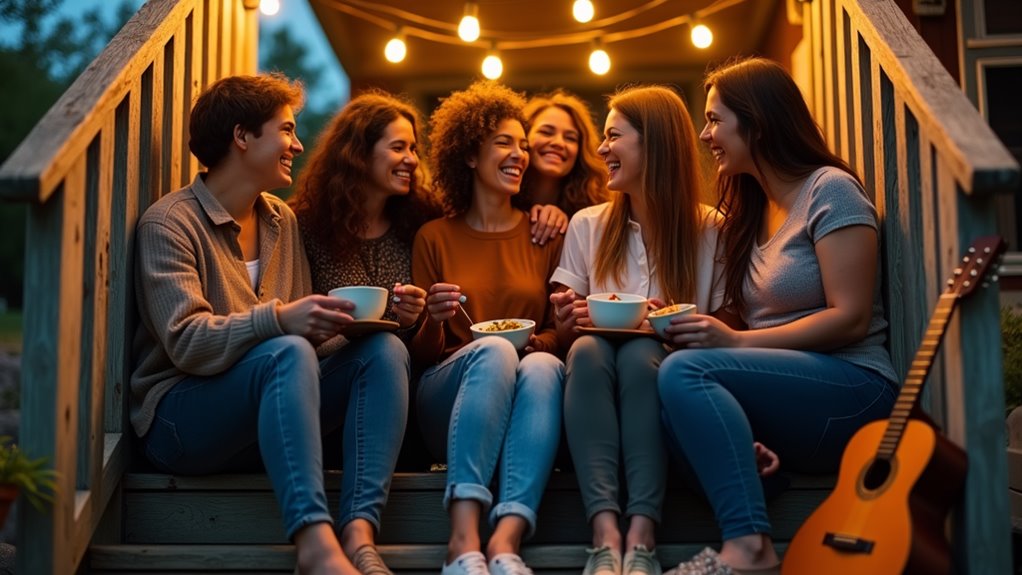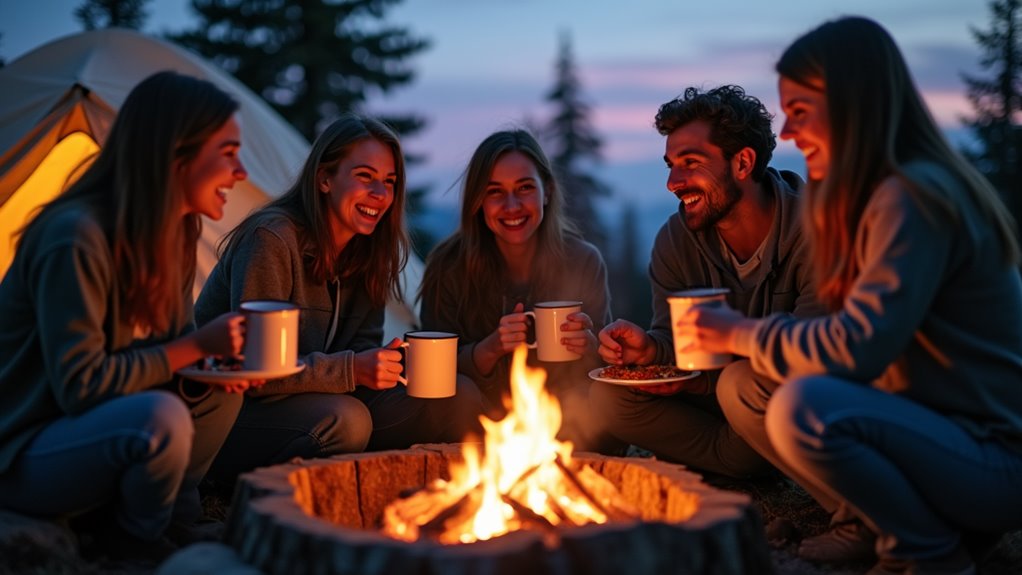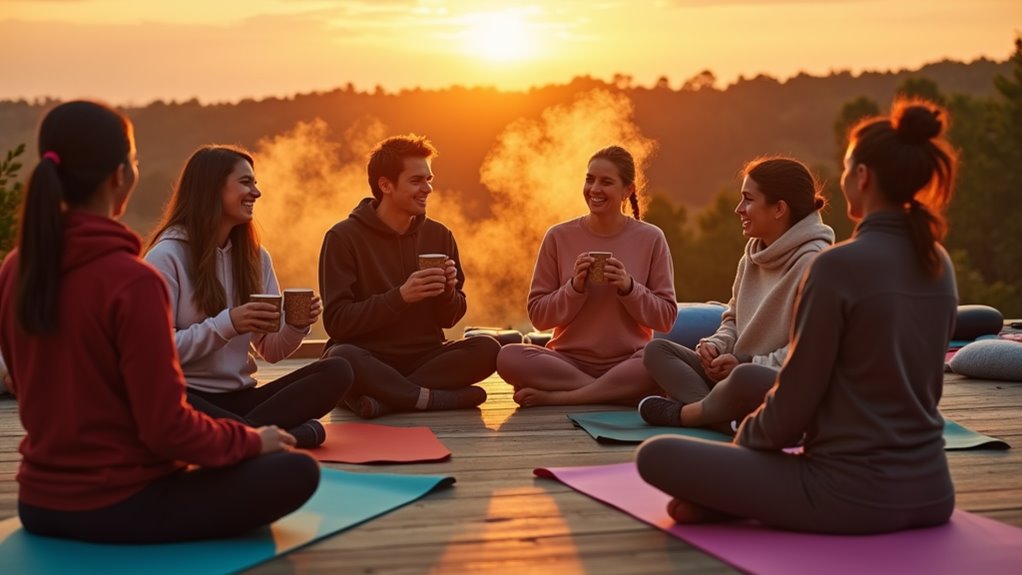Your social circle profoundly influences your lifestyle, health, and personal development through powerful biochemical and behavioral mechanisms. When you connect with like-minded individuals who share your core values, your brain releases feel-good chemicals that reinforce positive relationships and habits. Strong social bonds can lower your blood pressure, boost your immune system, and even help you live longer. While digital connections help maintain relationships across distances, in-person interactions create deeper emotional bonds through nonverbal cues and shared experiences. By expanding your social horizons and stepping into new environments, you'll discover the transformative power of finding your true tribe.
Key Takeaways
- Strong social circles trigger positive biochemical responses, releasing oxytocin and dopamine that reinforce healthy relationship patterns and overall wellbeing.
- Identifying and living according to core values naturally attracts like-minded individuals, creating more meaningful and sustainable social connections.
- Regular engagement in shared activities and interests helps build deeper bonds while expanding personal perspectives through diverse interactions.
- Balanced combination of digital and in-person relationships provides comprehensive social support across different life situations and distances.
- Intentionally seeking new environments and experiences broadens social networks while creating opportunities for personal growth and lifestyle enhancement.
The Science Behind Social Connection

While humans have evolved as social creatures over millions of years, our need for connection runs deeper than casual interaction. Your brain releases oxytocin, dopamine, and serotonin when you engage in meaningful social bonds, creating a biochemical reward system that reinforces relationships.
You'll find that your social connections directly impact your physical and mental health. Strong relationships can lower your blood pressure, boost your immune system, and reduce anxiety levels. When you're part of a supportive social network, you're more likely to develop healthy habits and maintain them long-term.
Research shows that people with robust social circles live longer and recover faster from illness.
Your brain actually synchronizes with others during social interaction, a phenomenon called neural coupling, which enhances communication and empathy.
Identifying Your Core Values
Authenticity forms the foundation of meaningful social connections and lifestyle choices. To build genuine relationships, you'll need to first understand what matters most to you. Start by reflecting on moments when you felt most alive and aligned with your true self.
Your core values serve as your internal compass, helping you make decisions that resonate with who you are. Take time to list what you believe in – whether it's creativity, honesty, adventure, or family.
Consider how these values shape your daily choices and the people you're drawn to.
When you're clear about your values, you'll naturally attract others who share similar principles. This alignment creates stronger bonds and helps you build a social circle that supports your authentic self and chosen lifestyle.
Building Meaningful Relationships

Once you've identified your core values, you can begin fostering deeper connections with others. Start by seeking out people who share similar principles and aspirations, as these relationships tend to be more sustainable and fulfilling.
Focus on quality over quantity in your relationships. Listen actively, show genuine interest in others' lives, and be willing to be vulnerable yourself. Make time for regular, meaningful interactions – whether through coffee dates, shared activities, or deep conversations.
Remember that building strong relationships requires consistency and patience. Check in regularly with friends and loved ones, celebrate their successes, and support them during challenges.
Be reliable, honest, and authentic in your interactions. These intentional efforts will help you create lasting bonds that enrich your life and align with your values.
Digital Vs In-Person Social Circles
Although both digital and in-person connections play vital roles in modern social networks, they each serve distinct purposes in our lives.
Digital connections let you maintain relationships across distances and time zones, offering instant communication and regular updates about friends' lives. You'll find that online communities can connect you with like-minded individuals who share your specific interests or experiences.
In-person interactions, however, provide deeper emotional bonds through nonverbal cues, shared experiences, and physical presence. You can't replicate the warmth of a hug, the energy of group laughter, or the subtle nuances of face-to-face conversation through a screen.
While your digital connections might help you stay informed and connected, your in-person relationships often form the cornerstone of your emotional support system and personal growth.
Breaking Out of Comfort Zones

You'll find personal growth when you break free from your established social patterns and seek connections beyond familiar faces.
It's crucial to step into new environments where you'll meet people from different backgrounds, careers, and perspectives.
Whether you're joining a new club, attending industry mixers, or exploring hobby groups, these fresh social settings can transform your network and worldview.
Challenge Old Social Patterns
Breaking free from established social routines can feel intimidating, yet it's essential for personal growth and expanding your horizons. You'll need to examine your current social patterns and identify which ones no longer serve your goals or values.
Start by questioning habitual behaviors like always meeting the same friends at the same places or maintaining relationships that drain your energy.
Take small steps to reshape your social landscape. Try visiting new venues, joining different interest groups, or reaching out to people you've wanted to know better.
Don't feel obligated to maintain outdated social commitments just because they're familiar. Instead, focus on cultivating connections that align with your authentic self and current life direction.
Network Outside Your Circle
Why limit yourself to familiar faces when a world of diverse perspectives and opportunities awaits?
You'll find that stepping outside your usual social circle opens doors to fresh ideas, experiences, and connections you never imagined possible.
Start by joining groups or activities that align with your interests but attract different types of people.
You might discover a hiking club, volunteer organization, or industry meetup where you'll encounter individuals from various backgrounds and age groups.
Don't shy away from conversations with people who think differently than you do.
Online platforms and social media groups can also help you connect with people beyond your geographical boundaries.
Nurturing Long-Term Friendships
While many relationships come and go throughout life, long-term friendships require consistent nurturing to stand the test of time.
You'll need to invest regular effort through meaningful conversations, shared experiences, and genuine support during both celebrations and challenges.
Make time for your friends, even when life gets busy.
Schedule regular catch-ups, whether through video calls, coffee dates, or weekend activities.
Remember important dates and show up for significant life events.
Be reliable and follow through on your commitments.
Stay authentic in your interactions and address conflicts openly when they arise.
Don't let small misunderstandings fester into larger issues.
Practice active listening, show empathy, and maintain healthy boundaries.
These habits will help your friendships deepen and evolve as you both grow.
Creating Shared Growth Experiences

Strong friendships thrive when people grow together through shared experiences.
You'll find that taking classes, starting projects, or exploring new hobbies with friends creates lasting bonds and mutual understanding. Whether you're learning a language, starting a book club, or training for a marathon, these activities foster connection through common goals.
Look for opportunities that challenge both you and your friends to step outside your comfort zones. Plan weekend workshops, attend seminars, or volunteer together for causes you care about.
These shared experiences create conversations that go deeper than small talk and build memories that strengthen your relationships. You'll discover that growing alongside others not only enriches your friendships but also accelerates your personal development through motivation and accountability.
Frequently Asked Questions
How Do I Handle Toxic Relationships Within My Existing Social Circle?
Set clear boundaries and communicate your concerns directly with toxic individuals.
If they don't change, limit your interactions and protect your emotional well-being.
Don't feel obligated to maintain harmful relationships.
Instead, spend more time with supportive friends who uplift you.
You can gradually distance yourself or, if necessary, cut ties completely.
What's the Ideal Size for a Close-Knit Social Group?
Research suggests you'll do best with 3-5 close friends and up to 15 people in your core social group.
This aligns with Dunbar's number theory, which shows you can maintain meaningful relationships with a limited number of people.
You'll find it easier to coordinate gatherings, share deeper conversations, and build trust with this size group while avoiding the complications that come with larger circles.
How Often Should I Meet With Friends to Maintain Strong Connections?
Like Rome's enduring friendships weren't built in a day, you'll need consistent contact to maintain strong bonds.
Aim to connect with close friends at least once or twice a month in person, and supplement with weekly texts or calls. You don't need daily interaction, but regular, meaningful contact prevents relationships from fading.
Quality matters more than quantity, so make your meetups count with genuine conversations and shared experiences.
Can Introverts Successfully Build and Maintain Large Social Circles?
Yes, you can build large social circles as an introvert, but you'll need to approach it differently than extroverts.
Focus on quality over quantity, and maintain connections through methods that suit your energy levels, like one-on-one meetups or small group gatherings.
Use digital communication to stay in touch between in-person interactions, and don't force yourself to socialize beyond your comfort zone.
Remember to schedule alone time to recharge.
What Role Do Age Differences Play in Forming Meaningful Friendships?
You'd think hanging out with someone who remembers dial-up internet while you're busy making TikToks would be a recipe for disaster, but age gaps in friendships aren't what they used to be.
You'll find shared values, interests, and life experiences matter more than birth years.
Whether you're connecting with someone decades older or younger, authentic connections transcend age when you're both willing to learn from each other's perspectives and life wisdom.
Conclusion
You might worry that seeking your tribe feels forced or inauthentic, but remember that genuine connections often start with intentional choices. As you've learned, surrounding yourself with people who share your values and support your growth isn't just about comfort – it's about thriving. Whether online or in person, your social circles shape who you become. Take that first step to build the community you need.

Leave a Reply